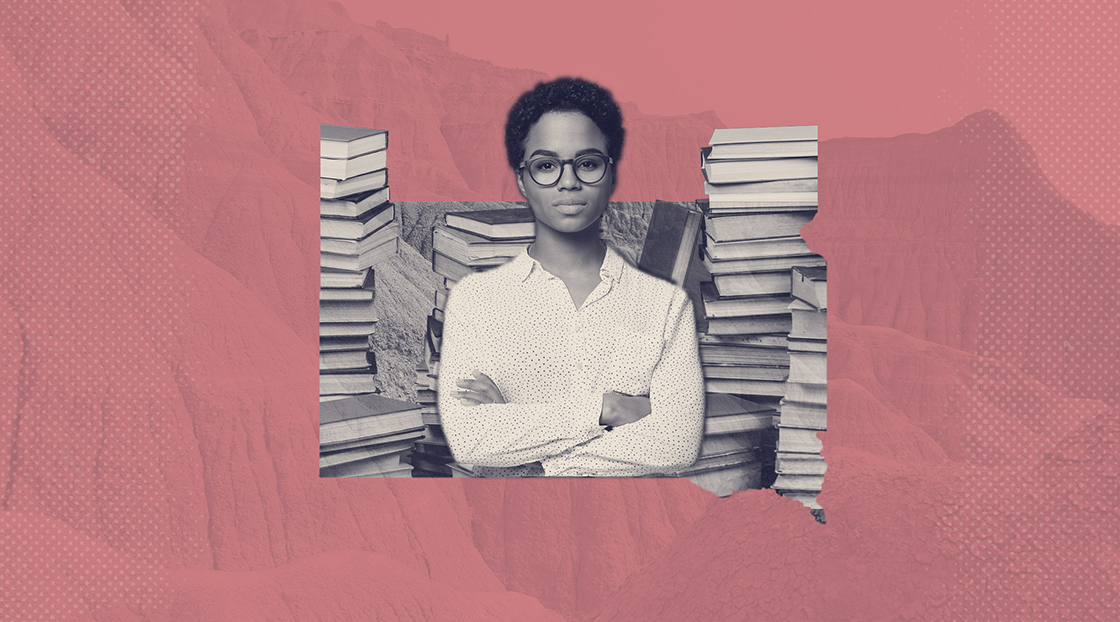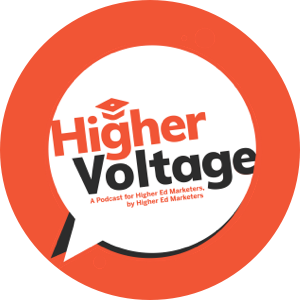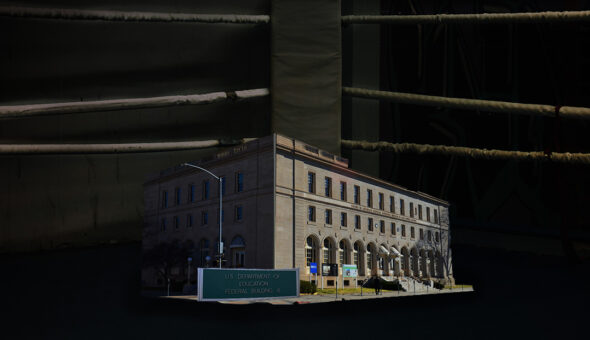Read the full transcript here:
Kevin Tyler:
Higher Voltage just brought to you by Salesforce. Today’s higher ed marketers, face new challenges and must expand beyond traditional tactics to engage their many audiences. Learn how Salesforce empowers institutions of all sizes to unify first party data, build and measure targeted campaigns, and deliver personalized messaging across channels. Visit salesforce.org to learn about how Salesforce can help your college or university achieve its goals.
Kevin Tyler:
Hello, and welcome to Higher Voltage, a podcast about higher education that explores what’s working, what’s not, and what needs to change in higher ed marketing and administration. I’m your host, Kevin Tyler.
Kevin Tyler:
Welcome to Higher Voltage. Thanks for tuning in today. Today’s guest Dyanis Conrad, formerly of the University of South Dakota, and now in a new spot we’ll get to a little bit later. We’ve invited Dyanis onto the show today because of a recent article back in June, about how she was in the center of a political debate in the state of South Dakota about CRT and USD being a bit of a woke campus. And I’ll have, Dyanis kind of dig into the details of that experience in South Dakota in a bit, but first I want to welcome you to Higher Voltage. Thank you very much for taking the time today to join us and have this very important conversation that I feel like we will be having over the next couple of years, as the political winds continue to blow across the country, especially on college campuses. Dyanis, welcome to Higher Voltage.
Dyanis Conrad:
Thank you very much for having me. As you mentioned, I’m Dyanis Conrad. I will be employed with Randolph-Macon College in Ashland, Virginia as an assistant professor of equity and diversity and education, and sort of shifting me to sort of center my work around more of the research that I’m doing and the things that I want to do to contribute to a more equitable society. So, I research a lot of social and educational inequities and injustices, and I also look at lot of at racial literacy and sort of having a dialogue around how we can discuss and unpack some of these sort of colonial frameworks that were sort of embedded within at this time.
Kevin Tyler:
I think that is fascinating. I think that your expertise is one that will be needed in the years to come, especially in higher ed, especially in the conversation, as it relates to the conversation we are about to have. I’m wondering if you can give us and our listeners a high level recap or overview of what brought your name into the Chronicle of higher education, into the awareness of the governor of the state of South Dakota. Why was this article published now? And what was the experience like?
Dyanis Conrad:
It’s been an interesting rollercoaster with the Chronicle article. I have to admit just the anxiety of not knowing how things will be framed or how your words will be interpreted, but there were a lot of moving parts over the last few years that led to the publication of that article, beginning primarily, I think, with the publication of a hate webpage in the state called [inaudible 00:03:03] South Dakota, and it specifically was created to attack the efforts across the state of faculty, staff, institutions of higher education sort of engaging in dialogue around diversity, equity, inclusion. So, many universities over the last decade have really sort of pushed to unpack and sort of look at and sort of improve, sometimes for accreditation purposes, sometimes with other motivation, try to improve the experience and the opportunities available in education. More recently, a lot of those terms, diversity, equity, and inclusion have been co-opted by politically conservative folks, and there’s been a push from state legislature and from the governor’s office to frame these efforts as a personal attack against their racial identification.
Dyanis Conrad:
So, they see the word diversity as something that is anti whiteness, so they are coming at it from that perspective. Couple of state journalists, I spoke to mentioned that my name was given to them when they tried to reach out to individuals, both in the legislature and in the governor’s office, as to some of the motivation behind why they felt the need to push pieces of legislation through, the anti CRT bills and et cetera. So, because my name was thrown out there, they reached out to me to see if I had something to say, and that led them to interview me. I think the Chronicle probably caught some of those local or those state pieces, and sort of pulled from that. There is this spread of race evasive thinking across the country that I think sort of motivated. It’s not just South Dakota. It’s not just Florida. It’s not just Texas, but there’s this spread of race evasiveness or what we used to call color blindness that is sort of very sort of permeating our society at multiple levels.
Dyanis Conrad:
And I feel that the Chronicle is sort of looking out, reaching out to scholars who are dealing with that pushback in higher education, because it almost seems counterintuitive or contradicted what is actually supposed to be happening in institutions of higher education.
Kevin Tyler:
How did your name get on the desk of the governor of the state of South Dakota? What was going on your campus at the University of South Dakota that prompted all of this activity around you and what you were doing there?
Dyanis Conrad:
Honestly, if I had an answer to that, I probably would solve half of the crisis in the state. No, I actually have no idea what would’ve prompted…. I’m not the only person in the state that has these conversations. I am not the only person, even at my institution, USD, that has these conversations. It’s been suggested to me that I was one of the most visible persons because of factors like race or [inaudible 00:05:36]. I was easiest to identify and target. I think when the journalist I spoke to, when they were referred to my name, a lot of it was based on series of panels I did. The USD School of Health Sciences held, over, I think the fall of 2020, they had a series, I think every two weeks. They had a panel. It was about two hours long, where they invited faculty, staff and students to join and discussing very specific things.
Dyanis Conrad:
So, I think one was on implicit bias. One was on social justice, things like that sort of taking a full two hours to unpack each of those things as it relates to medical sciences or health sciences, so that their students and faculty have a better understanding of how these things impact their communities. And there were a lot of clips, I think, that were taken, so that was… Once those were recorded, it was provided also open access to faculty, staff, and students. So at some point, that got out beyond the campus community. I’m not sure exactly how. Maybe somebody posted, maybe somebody shared, because when that first… I think article four was the first one that specifically mentioned my name, and it was a paragraph that talked about how I was indoctrinating South Dakota teachers into what they call a social justice wokeism.
Dyanis Conrad:
And it was based on some of the clips from that. There was actually a podcast, I think that triggered all of it, the spring of 2020, that I did that talked about social justice in relations, I think during February, so during black history month. And so, I was invited by someone to sort of talk about those things. And a lot of those pieces got pulled together, so I think… Because that’s what I do, those topics are what I teach, they’re what I research, they’re what I feel passionate about, I don’t get to turn off diversity at 5:00 PM. It is my lived experience as well. I feel that there was no shortage of ways to sort of find things that I’ve said in relation to one of those things. I think it’s probably easy to sort of gather information of things that I’ve said openly, because everything that I talk about is research based.
Dyanis Conrad:
It is what, I think within my [inaudible 00:07:38] is considered sort of fact. So, it’s not that I feel like I need to defend anything that I say, so I sort of speak very clearly from those perspectives. And I’m teaching students who… My first couple years, when I did a survey in my class, I think almost half of my students my first few semesters, I was the first person of color that they had interacted with beyond a fast food takeout window. They had never had a conversation with someone who looked like me, far less had a teacher that looked like me. And it caused me to take a step back and really sort of unpack what do they need. Rather than me just lecturing about these concepts, where do they need to get to provide effective and welcoming experiences for my kid and other kids and all the kids that they encounter. And where are they now?
Dyanis Conrad:
And sort of my efforts to fill in those gaps and help them be better teachers and be more effective community members create more welcoming spaces, a lot of those efforts sort of gave them the fuel to pull from because I spoke openly in recordings where you could access those things nowadays easily.
Kevin Tyler:
I’m continually fascinated by the term woke, especially when it comes to college campuses. And this idea that having an understanding of another kind of person’s lived experience and their history is somehow damaging or indoctrinating. I’m curious what you think this concept of woke campus means to you as a faculty member and what it does to the way that you teach, if anything.
Dyanis Conrad:
For me, the term woke indicates that an individual is aware and alert to injustice, marginalization, and disenfranchisement across multiple aspects of society, both historically and in sort of contemporary life. For me, is an individual thing, someone who actively seeks to understand those connections, the connections between the past, what we’re dealing with now, how this could shape the future for generations to come, and someone who is willing to push themselves to think critically, even when it’s uncomfortable, because growth happens in uncomfortable moments. So, for me, that’s what woke stands for. Unfortunately, the term has been misused. It’s been overused. It’s been sort of thrown around willy-nilly for a few years now. And within specifically conservative politics, many people have misinterpreted the term intentionally. I don’t know. I’m still deciding how much of it is intentional and how much of it is almost willful ignorance, but they’ve used this term to create propaganda, to sort of stir up their masses in a way.
Dyanis Conrad:
So, many people are using it to infer anti whiteness and to cater to almost a movement of anti-intellectualism and this us versus them narrative. That’s sort of the fake myth of life being pie, right? So, everything that I get from my family means that you have less for yours, that sort of idea that’s sort of embedded in the capitalist narrative. I see how people are using it differently, but in terms of a woke campus, I think that it’s a fallacy. A lot of the threats, a lot of the arguments are that we are creating these woke campuses, we’re creating these spaces where all these students are going to come in and be brainwashed to be kind. Is that really the problem, that you think we’re brainwashing children to be good humans? So, but the idea that any campus, that any Institute of higher education has this hive mind mentality where everyone comes in differently and exits the same, that’s not education. That’s not what institutions of higher education are trying to do or what they’re actually even…
Dyanis Conrad:
It’s not even possible to achieve that even if we wanted to. So, I feel like that idea of a woke campus implies that hive mind, which isn’t really plausible in most context. In South Dakota particularly, it’s being used as propaganda to make people feel that their children are being harmed. But again, I always ask, being harmed by let’s be kind, let’s sort of think about how we did wrong things and how we can do them better? I mean, isn’t that what we teach our kids, right? Okay, you broke this thing at home. Let’s figure out… Let’s talk about what happened. Let’s look at these consequences. You dropped this thing that you shouldn’t have been playing with. It broke all over the floor. Okay. So, now we have to learn from that moment so that we don’t play with things that are fragile or that we don’t drop things that are important to us.
Dyanis Conrad:
And that’s the whole [inaudible 00:12:14]. That’s how we learn. So, I feel like it’s a term meant to get people all angry without knowing what they’re angry about. But my goal as educational faculty is very simple. It’s to make sure that my students have the tools, understand the foundations of the society that we live in and the foundations of the education system that they are trying to become a part of in a much more influential way. So, they came through this system, but now they’re trying to be the ones to lead this system. So, as an educator, specifically as a teacher educator, it is my responsibility to make sure that they have the tools to do that. And when we talk about education and teacher education, specifically, one of the things we tell students, the one universal… It comes a lot. We emphasize it now through things like cultural responsiveness, but it’s still one of the basics of good teaching. Get to know your students. Get to understand them. Get to know their communities. Get to know their experiences/ get to understand who they are.
Dyanis Conrad:
Because as a teacher, when you do that, you can make very deep and meaningful connections with students, with their communities, with their humanity. And when you build those relationships… I think Rita Pierson has an amazing TedTalk. She passed a few years ago. The importance of building relationships. And when you have those relationships with your students, it gives you unimaginable tools for success. It gives you the tools to navigate academic challenges with your students. It gives you the tools to navigate disciplinary challenges with your students, building those relationships. So, how can I build a relationship with the student when I’m not taking the time to understand the lived experiences of their community, both in the now and in the past, and what has shaped their communities, what has shaped them to have these challenges?
Dyanis Conrad:
As important as it is for me to understand, make sure that, when they were a kid, did they have good access to healthcare? Did they have good access to nutritional food? Did they have good access to welcoming spaces? Did they have good access to equity and academic opportunities? all these things are equally important. So, I believe that, because of both individual bias throughout globally, as well as specifically in the United States, and the systemic issues that come from the relatively unique history in the United States and how that played out, I think so many of our nation’s children across multiple grade levels, and even as adults, are building, are making choices, making decisions, hiring, firing, changing people’s lives based on an inaccurate understanding of what has come before, and why we’re facing certain challenges now.
Dyanis Conrad:
So, at least a third of my students across six years at USD came to my classes believing that Native Americans moved to reservations to avoid white people, that they did it voluntarily. I have a copy of a textbook from my kids homeschooling during COVID that said that Native Americans moved west to create space for these new settlers, right? It made it seem so peaceful and happy and so voluntary. So, they’re coming into college, four years from being a teacher to the next generation of leaders, believing that Native Americans just kind of wanted to chill on reservations and they wanted to do that. And I used an example because of my experience in South Dakota. So, I went into South Dakota knowing so much about this. And when I got there, I still knew so little. And I had to learn. I know 400 times more than I knew when I got there and I still know nothing about the experience. So, I think it’s all about being able to learn, but there are teachers who are going out into classrooms teaching that.
Dyanis Conrad:
They’re teaching that because they were taught that, and because their teachers were taught that. So, if we don’t do something to stop that cycle, to interrupt that cycle, then this is going to continue and continue and continue. So, without a true understanding of the numerous intentional laws and intentional policies that we’re meant to destroy native culture and native histories and native communities and native life. But the Dawes Act, boarding school realities, bounties on native Americans, all of those things, without understanding all of those pieces, you will never be able to connect meaningfully with the experiences that your students are bringing to the table. We talk about funds of knowledge. We have to know where to start. And if we don’t give the background, then how do teachers know what to do?
Dyanis Conrad:
So, they’re not going to be able to make those critical connections. And that’s my job. My job is to figure out where they are. So, where did their K12 experience get them to? And how to fill the gap between where they are when they get to meet versus where, as a parent, I would want them to be before they enter a classroom.
Kevin Tyler:
I think this is fascinating, and mostly in an unfortunate way, what you have explained around how students arrive at college can be reflected in other professional tracks as well, right? In nursing, you can still find professors saying that brown skin is thicker and tougher, and there’s a higher tolerance for pain. These are points that have changed the way people view others. And becoming a woke campus, like you said, is about understanding other people who you share space with, you discuss things with, and understanding their backgrounds, and again, lived experiences. And I find, from a marketing perspective, which is what I do for a living, for higher ed specifically, that the frequency with which we hear, my agency hears from institutions, a desire to recruit more diverse classes without having the support services or the diversity of professors, without having the systems and structures in place to help people thrive in an environment. Inviting diversity is nothing if no one is actually getting to where they need to be. And if that makes a woke campus, then that’s a woke campus.
Kevin Tyler:
And so in the marketing, I think we have to be real about things. And I was going to read one of the excerpts from the board of regent’s announcement or their statement around this whole conversation. And it’s a paragraph that I think is important to read all of, because this is a public institution, a public system of higher ed in South Dakota. One of the points in this, “South Dakota’s state universities are public taxpayer funded institutions. It is inherent in the missions of our universities to,” and this part’s bolded, “proudly support the United States of America. Our students will learn about America’s history, our system of individual liberty and a democratic Republic, and our system of free enterprise. Part of that instruction is to acknowledge and discuss America’s flaws and mistakes so we can learn from them and improve. We celebrate though, America’s role in recent world history as the nation most responsible for expanding liberty, prosperity, and equality across the globe.”
Kevin Tyler:
But we have, in the background of this statement from the board of regents of South Dakota, this effort to remove all instances of diversity, equity, inclusion from the campuses, rename them as opportunity centers, which have a role. They support a kind of student who can come in and study or whatever they need to do. And they call out specifically students with disabilities, veterans, students, but any other kind of diversity is pretty much erased. And as a marketer, I would have a problem telling that story, having a desire to recruit diverse classes, but we have this other effort from the leadership perspective. How do we reconcile those two things so that people can still learn what they need to learn about the world, but also exist in this diversity free environment that has been created in the state.
Dyanis Conrad:
I’m not absolutely sure that it’s possible to reconcile those things. I think that if you continue with that train of thinking and that line, that you damage the quality of education that you offer, and I think that’s where the real issue really sits. So that language, for someone who is not a deep, critical thinker, who doesn’t understand the history of these issues, the language is fairly neutral. Right? Sounds pretty good. We’re all for America’s grade and we’re all for acknowledging all these wonderful things, all positive. But if you are a deep critical thinker or you have any knowledge of us history in any meaningful way, you can read between the lines, and you can see that in many of the parts of that statement, they just left out the word white. That word white was just unsaid because it is so normalized and so understood, right?
Dyanis Conrad:
And I’ve have my… And it’s a podcast, so quotation [inaudible 00:20:46]. It’s so understood that they don’t feel it needs to be said. So, maybe they do think they’re including everyone, but they’re including everyone from a frame of whiteness. So, if I am using whiteness as my lens to determine value, and whiteness systemically as an oppressive force, then how am I going, in any way, meaningfully be able to look at things from a critical perspective. I think Nicole Hannah Jones, in an interview that I saw her do, was one of the first ones that talked about that concept of that invisible whiteness. The word white is there. It’s not written, but we see it. We know what you’re talking about. And I think it’s important. I mean, there was a meme that was… And I hate to prefer the memes, but there’s some good ones out there.
Dyanis Conrad:
And there’s a meme that I saw recently that talked about Thomas Jefferson. And he is one of the most controversial figures out there. And I very often will, in my courses, ask students to write down everything that they know about an event or a public figure. And then we try to look deeper into the story. And it usually is an instance of shock, because in their mind, he’s a president, right? He’s one of the great presidents. He has all these memorials and libraries and all these things. We honor him. We give tours of where he lived. We refer to the person that he kept in sexual slavery as his mistress. We make everything so nice and pretty. But when we think about it, he was one of the slave owners who actually enslaved the largest number of humans in the entire period that he was around.
Dyanis Conrad:
So, yes, we can look at him and say there are some good things that he did, but human beings are not one dimensional. If we can’t see that there may be great leaders who did terrible things or terrible people who did great things, then we’re not really painting a full picture. We think about Abraham Lincoln. People refer to him as this massive savior because he freed the slaves. Well, it wasn’t like he was doing it from the goodness of his heart. He had political motivations to do so, but he also ordered the largest mass execution of Native Americans in the country. We have to be able to look at both of those pieces to understand who he was as a leader, and to learn from his successes as well as from his failures. So, I feel like if something isn’t done in states like South Dakota to disrupt those paragraphs and those narratives, then what you will have will be sort of a dumbing down of generations, because they’re going to be…
Dyanis Conrad:
We’re far enough removed that students are fairly lost about basic things. I hear students trying to figure out all the time why the symbol on their cell phone for call is a C. They think it means C for call, because they’ve never seen a phone that looks like that. And that’s just 30, 40 years ago, far less things that happened a hundred or more years ago. So, the further away we get, the less chance we have of being able to reclaim that without massive top down intervention.
Kevin Tyler:
I’m glad you brought up Nicole Hannah Jones. That was a case that I watched carefully in North Carolina, around the board of regents there getting involved in the hiring, all the decisions that they made and how that surfaced in the news cycle the way that it did. Another case in Florida around academic freedom and the professors that were kind of blocked from testifying by the state government. We have South Dakota. I’m curious, in your opinion, as a faculty member, what do these legislative efforts indicate for the future of higher education in states like those referred to before?
Dyanis Conrad:
Well, it’s more of the same stuff we’ve been seeing for generations, right? Nothing has changed. It’s the centering of Eurocentric lives, Eurocentric histories, and Eurocentric norms as a way to silence the voices of historically underrepresented groups under a pretense of anti divisiveness. So, one of the terms that’s been floating around, both in Florida and South Dakota, is divisive. You can’t talk about these divisive things. And on more than one occasion I’ve reached out to the governor’s office, once on Twitter, and just said, “What is so divisive about the simple facts of our nation’s history?” These are stated facts. They’re documented. Nobody’s making things up. I feel like… It’d be thing if I’m sort of teaching from my personal, “I don’t like these people and I don’t like these policies.” But looking at sort of statements of history, I worry that the quality of educational experiences for students will go down.
Dyanis Conrad:
I worry that anyone who doesn’t fit into these accepted norms within systemic whiteness will suffer. I worry that my colleagues will be forced into silence in order to preserve their mental health, or just to maintain the ability to provide for their families. It’s harmful. And without people to push back with the truth, this could lead to very severe and long term issues that will damage so many aspects of US society in years, for many, many, many years to come. If we have students growing up, believing that racism isn’t real, because that’s one of the divisive topics, right? We can’t talk about racism, unless your class is about race. That’s the one loophole, right? But then if a student reports you, that’s a bad thing too. So, if students grow up believing that racism is real, and then they grow up to become judges and doctors and teachers and casting pros in LA, and all the different things, then it’s going to keep getting worse, nothing will improve.
Dyanis Conrad:
We see those issues clearly now in healthcare, in law enforcement. You mentioned some things earlier. Just recently, a study came out talking about the fact that they realized that pulse oximeters, that we were using to check oxygen levels during COVID, they don’t read on dark skin accurately. That’s major, right? When you think about the effect of not having correct readings off of the color of your skin, how many people do you think maybe didn’t get care or treatment because the pulse oximeter couldn’t bounce the light off a dark skin well enough. You look about the gentleman in the UK who just came out with you first ever encyclopedia for dermatology on dark skin ever. When you think about how that could trickle down and sort of spread out through our society, these conversations permeate all aspects of society. They won’t get any better if politicians try to push more propaganda to fulfill their personal, political aims. I think we can be proud of the aspects of our history while also acknowledging our mistakes and our challenges. I don’t think it’s possible to pretend that one thing exists and the other doesn’t.
Dyanis Conrad:
And I feel that what they’re effectively legislating is our ability to create a society that is kind and welcoming and inclusive, and where every single individual feels that they’re [inaudible 00:28:06]. And I have no idea why you would legislate against a good place to be.
Kevin Tyler:
I think it’s a fascinating point. And I appreciate you framing things in whiteness, because I think that term, divisive, again, your question, who is this divisive to? It’s not divisive to the folks who are the descendants of the folks who were traumatized and killed and whipped all of those things. And that term, in and of itself, is framed in whiteness, right? [inaudible 00:28:34]
Dyanis Conrad:
If you think about it, when you say that we’re harming children in South Dakota by doing this, that’s where that invisible white comes in, right? Because kids like mine, kids who are black and brown across the state, for the most part, unless their own societal learning was kept from them in an educational setting, for the most part, these are conversations they’re having or overhearing even at a young age. On kitchen table, when family gets together, especially when elders get together, they hear these conversations. These are things that, from the most part, they are aware of and are working to deal with. So, yeah, that invisible white is very, very powerful in terms of how that’s framed and how that’s pushed across through legislation.
Kevin Tyler:
Yeah. And from a marketing perspective, I have been on campuses and have heard people say… When asked, “Why are you interested in a more diverse class?” The answer has been, “Well, diversity would benefit our students quite well.” And that is also framed in whiteness, right? It assumes that it’s just a whole bunch of white people who just need to be in contact with other kinds of people. And if we don’t change the way we talk about things or point out the nuances of language, when we talk about things like diversity, equity, and inclusion, then it’s harder to get to the point where we’re trying to make if we can’t even get the language right. If you can’t understand how the filter of whiteness exists in the setting up and in the foundation of higher ed, we are not going to make as much ground as we need to as quickly as we need to make it.
Kevin Tyler:
I know that you just moved across the country from South Dakota to Virginia to start your new position at Randolph-Macon. And I’m curious about how these threats to academic freedom that we’ve seen in the states, we’ve talked about already, has changed the way that you assess job opportunities at other institutions. Have you looked at the politics of the state? And do they influence your decisions and where to interview or where to explore more by opportunities? Or, how has that evolved?
Dyanis Conrad:
Yes, it has changed the way that I look at opportunities, but I think part of that is due the fact that I’m no longer a recent graduate. So, I have a history of work, which gives me a certain privilege in terms of the amount of confidence in my expertise and experience that I carry. Would I have been so intentional or discerning fresh out of grad school? I don’t know that I would have the privilege to be in a market like this. But in my current stage of my career, I think that it has shaped it very, very specifically the way that I assess opportunities for myself and for friends and colleagues that I care about. I made the choice to move to an institution where my work would be valued and embraced, but this conversation doesn’t end. No institution is perfect. No state is perfect.
Dyanis Conrad:
These challenges are going to follow wherever. State laws in themselves do not scare me. I am not threatened by South Dakota law or Florida law or anybody else’s laws. I am trained and very confident in my ability to work with both explicit and subversive resistance. So, the law doesn’t change. What I do. The law may just change my approach to what I do in terms of getting my point across while still not necessarily causing harm to my students or colleagues by drawing unnecessary fire their way, but at the same time, I feel that I did not eliminate any states based on law. That was not a factor at all on legislation. A mentor once told me in that in our field, “You are either going to find a job where your work is either valued or where it’s needed, but very rarely will you find a space where both of those things are happening in the same place.”
Dyanis Conrad:
So, I want to make a difference where my work is needed, and sometimes that can be a place with huge amounts of resistance. When I was looking at other opportunities, what mattered to me was a university’s demonstrated commitment, not stated commitment, but demonstrated commitment to unpacking the complexities of a nation’s history, as an active and integrated part of their overall curriculum, their policies, and their practices. So, I was very careful about looking at differences between what had been said. So, their optics, their accreditation, all those pieces, and what had actually been done, both at the individual level, looking at specific faculty, specific staff, as well as at institutional levels. And at what point would I be supported or get the standard, “Oh, well, good luck,” if I continue the work that I do and I get pushback from the state level? So, I was still looking at what kind of support I would have and what kind of actions they have taken in the past to earn my trust and that level of support.
Kevin Tyler:
When you talk about demonstrated commitment, are there certain things… I know it’s different from campus to campus, but is there a small list of, these are the things that I look for, like check box, that will give me an idea of the demonstrated commitment of an institution when you’re looking at an opportunity to work there?
Dyanis Conrad:
Last year sometime, I actually made a list. I was in a space where I wasn’t feeling meaningfully supported at that time. I had support from amazing colleagues who had my back, but in some spaces where, especially with administration, that support was very sort of subtle and quiet and couldn’t be public. So, I did make a list and I do have some general guidelines, I guess. So, first thing that looked at was public and private language. So, I just mentioned that the idea of what do they say they are committed to and what they say they do versus what have they actually done? So, a difference which led me to look at differences in policies and practices. So, what specific policies that they have, overt, proactive policies, do they have that address aspects of diversity? And I’m looking, sorry, very broadly at that.
Dyanis Conrad:
So, looking at aspects of diversity that are related to sexual orientation, related to everything from age, religion, gender, all the pieces of background, all the pieces of identity that make us who we are. But I’m also looking very specifically at how they address race. Because in conversations around diversity, you have many universities or many institutions who are willing to talk about veteran status. They’re willing to talk about disability. They’re willing to talk about things like that, but they are not willing to talk about sexual orientation. They’re not willing to get into race, but they will happily do all the other aspects of diversity, as long as you don’t bring up that r word. So, I want to see what they’re doing in all those different pieces. I also look to see where does the institution have, or does the institution have safe and welcoming spaces for individuals from historically underrepresented communities? Which, to me, demonstrates that they understand why there’s a need for those safe spaces.
Dyanis Conrad:
That it’s not that we want black people or brand people to have their own separate space, but that there’s a legitimate reason that these spaces are needed for an institution to commit to creating or developing spaces where those things can happen for faculty and staff and students. Looking at long term programs that address challenges at all levels, so looking at things like hiring. I mean, I spent a lot of time looking at Randolph-Macon, looking at their hiring practices, their promotion of tenure practices, classroom pedagogy, curriculum, across different context, and how all of those things… Diversity is not a checklist. It is not. It has to be embedded at all levels, and it has to be interwoven into all things, or you’re really missing the boat and sort of not being effective. I looked at funding. So, it’s one thing. If you have a really nice, pretty public statement that says that you’re committed, but do you have the money to actually back it up?
Dyanis Conrad:
Do you have it budgeted in as something that matters to you? Because if you can budget a football field or you can budget new equipment for your music department, or you can budget a new building, then you can budget diversity efforts. It’s about where your priorities lie. Looking at how they support people who meet resistance. So, have they had faculty that’s spoken out against different things, not necessarily just race, but spoken out? And then how have they supported those faculty, what kinds of specifically public support, where it’s not just a secret email or a secret in person conversation, but them saying, “We support our faculty. We support these efforts because we are committed to this as an institution”? Retention. I looked at, are they retaining faculty, students and staff from historically underrepresented groups, or are is there high turnover within historically marginalized groups, race, sexual orientation, et cetera?
Dyanis Conrad:
And one thing that I added since moving to South Dakota, the last thing I have on my list that I sort of was looking at how the university addresses their own history. So, many of our institutions are built on stolen land, particularly our public land grant institutions. Many institutions have built by enslaved peoples. They were sponsored by slave owners. How are you unpacking or aiming to unpack that legacy and how that legacy has shaped the education that you offer? So, that was something new that I added just based on conversations the last couple of years. A lot of institutions now throw in a land acknowledgement statement. I think the common terminology that people like to use is the original caretakers of this land. But for many institutions, it’s a statement. It’s just a statement. It’s to look good. It’s for the optics, but there’s no real commitment to addressing what that means.
Dyanis Conrad:
What does it mean to say that I am recognizing that we are on land that is not ours? And how am I using these profits? How am I using these benefits that come into my institution to make amends for some of the things. And not because I did anything wrong, not because my family did anything wrong or because I did something specific to hurt someone individually, but because I understand the system that I am benefiting from, even as for me, I’m a black woman and I’m an immigrant, so I can honestly say that my grandparents and great grandparents had nothing to do with anything that happened in the last 2 to 300 years in this country. However, I am benefiting in many ways from the system that was built. I am benefiting from my time here, I have become successful. So, it gives me an obligation and responsibility to try to do something that improves a situation for those that come after me.
Kevin Tyler:
I couldn’t agree with you more. And some of our listeners may find it interesting or some somewhat confusing why we are talking about this issue with South Dakota on a higher ed marketing podcast, but I am a firm believer that, especially when it comes to higher ed institutions, everything is marketing. And just like you have your list as a faculty member of what you’re looking at for an institution to make sure that it is a place that you will thrive in, students have a similar list that might not include what your ranking is, the student to faculty ratio is, or the student center, or the activities or the groups. Yes, that might be part of it, but there’s a whole other list for, especially as we start talking about, you know, the desire to recruit more diverse students. It is not just a line that you put in a strategic plan. It is not align in a president’s speech.
Kevin Tyler:
It requires investment, and it requires strategy, and it requires a desire to better understand the populations you are inviting to a place so that you can serve them in a way that means more to them. And if you understand where your students are coming from, and your faculty members, and your staff, and your leadership, you can help them get to where they’re going better. This is a marketing episode for this podcast, because we are not connecting the dots between what is stated in leadership communications and marketing communications, et cetera and what is actually happening on the campus, what we have is a gap. And that is a very bad gap to have, because what you then do is invite people to an environment that where they might feel harmed, where they might have to leave because of ridiculous racist incidents.
Kevin Tyler:
We have the black menaces on TikTok, which a colleague of mine just forwarded me yesterday, which I find to be absolutely fascinating. Going around the campuses and asking students, do you feel safe here? Or do you know who Rosa Parks is? Or do you know what the Stonewall riots was about? And the frequency with which people say no is kind of alarming, but it does go back to your earlier point about they arrived at college with this other kind of historical knowledge that isn’t as exactly accurate, but is supported by so many people in very high positions of leadership. And so, while it might feel kind of detached from our original thrust of this show, everything is marketing. Everything that you see out there, there all the news articles, all the decisions from political leaders in a state, and the way that an institution responds, how a leader of a, of a campus does or does not respond to a mass shooting, race related or not, people need to participate, right?
Kevin Tyler:
This is a participatory conversation around diversity equity and inclusion. It is not passive, and I feel very strongly about that. So I appreciate those points that you make. Because as a marketer, we are trying to tell a story. And I have zero interest in telling an inaccurate story. I don’t have any interest in helping to recruit students to a place where, like I said before, they’ll feel harmed. I don’t want to do that. I don’t want to feel that kind of responsibility. I just don’t want to do it. And so, as we recognize this kind of political trend of governors, getting involved in higher ed in ways never seen before… I mean, we se, board of regents are politically appointed positions by the governor. And so there’s a way of building a team that will support whatever the ideology is for any state through the higher ed system.
Kevin Tyler:
It is a remarkable thing to watch happen, and especially in higher ed where revolutions have been started, right? We have Kent State, shootings and what blossomed after that college campuses are an important part of our social justice fabric, right? If we can’t have conversations about the important things happening in society on a college campus, where can we have those conversations? And so I find that marketing for institutions going to look different in the future, and there’ll be some answers that are going to be required. There are going to be questions that are going to be asked from students, perspective students, faculty, prospective presidents. And if that checklist, whoever is looking at your institution, is using to assess your equality of your place is not filled with check marks. Then you have to work harder to get the people you want to get to your campus. I just feel like that
Dyanis Conrad:
That’s really the point. I think that higher ed isn’t going away, and no institution that I know of has a checklist under every single box as at a hundred percent, but it’s again, that awareness and that intention to do better. So, knowing what my policies and my practices, aren’t where they need to be in alignment. What are the steps we’re going to take to fix that problem? Maybe we need to do more here. Maybe there are things that we can do differently, but the engagement and the intention and the work has to be put in. So, it’s the idea that everyone’s on their journey, right? Even as an at an institutional level, institutions are on their journey and different institutions are at different stages along that journey. From a marketing perspective, that’s where that conversation is.
Dyanis Conrad:
These generations,, when I look at my little brother and I look at my kid, the way that they perceive college, higher education, professional work is vastly different than from my generation institutions of higher ed have to maintain their relevance. Our generations coming up. They’re far more interested in looking more deeply and having a more fulfilling life. And if you can’t offer a sense of safety, if I can’t learn at college, what I think I need to be a deep, critical thinker and have a positive impact on my community, then no amount of flashy website that has all the right words and all the right pictures in all the right places is going to make me want to come and either go into debt or use my hard earned money to get a degree, if I can’t do the work that I want to do in the future.
Dyanis Conrad:
It’s not just… For many students now. It’s not just about clocking in nine to five. They want to have free time. They want to be able to take vacation and have weekends off and participate in their community. So, why put myself in debt for a stamp on the forehead when there might be other paths to learn? There are no shortage of ways that I can learn about different things. And if college stops being a space where I can learn in a really in depth way… When we think about the great civil rights movement, we think about the brown power movement and the yellow power movement, all those movements that came out of higher ed institutions that started in universities and colleges around the country, college will be no more than a certification tool. It will stop being a place of learning.
Dyanis Conrad:
And I feel that without intentional action on the part of administration, marketing, different aspects beyond the classroom in a high education setting, then we are going to let, we’re sort of letting those opportunities for meaningful dialogue and meaningful change slip away, which then changes the way that we are perceived as a tool within a changing society.
Kevin Tyler:
I think that is exactly right. Before we close, I have one other question for you. And that is, from your perspective, personal, professional, whatever you want to take it from, what does the future of higher ed look like?
Dyanis Conrad:
I think that higher ed is [inaudible 00:46:31]. I honestly do. I think that higher ed… I choose to be in higher ed. I could probably make significantly more money in almost any other place professionally, but I feel that a meaningful path that I can take towards real change is working with the teachers that have the privilege and the power to make change or to do harm with our nation’s most vulnerable, our children. Right? If we look at history, we looked at the way that boarding schools were… They took children. They didn’t try to take adults. They took children because they’re so malleable at those ages. It’s so easy to change or shape children. We’re missing out the opportunity to shape positive things in our society. So, I feel that the question of the relevance of higher education is going to come more and more into place.
Dyanis Conrad:
And I think that there are things like the natural sciences, like. If you want to become a chemist or a lab scientist, you have to go to college, you have to get that stamp on your forehead. But, is that all we are doing? What is the real goal? It’s about breaking those pieces down. Why are we institutions of higher ed? This ivory tower that we’ve created is now irrelevant. Even within my field… I could choose to be at an institution that I have a good reputation, lots of things going on for me, where I’m just writing and publishing massive amounts of research papers and writing books and getting titles and awards, but how is that really making any change on the ground? How is that shaping the future for my child, for the children of others?
Dyanis Conrad:
How is that really shaping our community, our society, into a meaningful place that we can be proud of as ancestors, as ancestors to be. So, I feel that there is real danger here and that there is a closing window for institutions of higher education to really be clear as to their aims and their goals. And I find that more and more young people that I talk to, that’s what they’re looking at when they choose their institutions. All institutions have really cool websites. They all have really cool graphics. They all have all the techy things. They’ve all got the cool tours and the fancy food courts and all the things, but that’s not what a lot of students are looking for anymore. They’re looking for a place where they can connect, where they can feel seen institutions are going to going to lose slowly lose those populations.
Dyanis Conrad:
And more and more, a lot of these communities operate by word of mouth. So, if I go to a campus and it’s not a welcoming place to be, I’m not going to let my friends go. I’m going to tell my friends, “Little sister, nah,, you don’t want to go there. That’s not a place you want to go.” So, then that word of mouth becomes the thing that hurts you the most. And in a lot of communities, that’s how things roll. So, it’s about institutions really recognizing the limited relevance of a lot of what we do and understanding how that we need to make those connections and build those community links to be able to have any sort of meaningful conversations moving forward, beyond a multiple choice test anyway.
Kevin Tyler:
Right. Don’t get me started on that. Dyanis, thank you so much for joining us today. It was a pleasure chatting with you. And we’ll have the articles referenced in this episode included on the episode page. It was a pleasure. Thank you so, so much for taking the time today. I look forward to seeing what you do next, and I’ll be keeping an eye on your success at Randolph-Macon.
Dyanis Conrad:
Well, I appreciate you inviting me, and I most sincerely appreciate just you creating space for these kinds of conversations and the work that you do. So, thank you very much.
Kevin Tyler:
Thank you very much for saying that.
Kevin Tyler:
That’s it for this week’s episode of Higher Voltage. We’ll be back soon with a new episode. And until then, you can find us on Twitter @volthighered. And you can find me, Kevin Tyler, on Twitter @kevinctyler2.










